Day 6-7
Unfortunately, I am few countries behind as this post is written from Dakar about 10 days after our Guinea Bissau visit. As planned my family has now gone back to Denmark – meaning I have finally got the time to write these posts – hence frequent updates from the last two weeks (and after that the next two solo weeks) of travelling will follow soon.
This post is about Guinea Bissau. Not a country you hear a lot about. It ranks about the poorest in the world and some sees it as a “dangerous country” – I don’t know quite why because to me it seems and easygoing and friendly place. Maybe it is due to its violent past or maybe due to the fact that the economy mainly is based on the trading of cocaine. The main language is Creole which – as pidgin-english is it to english – is a simplified version of Portuguese.
We meet Sadaga at the chaotic Gare Routiere busstation in the southern Senegalese city of Ziguinchor from where “sept place” taxis go to Bissau, the capital of Guinea Bissau. The price for a  seat is just CFA 4.000 (USD 6) so this time we pay for all seven seats and are ready to leave instantly. The distance is only 170 kilometers but with a border crossing and a location in West Africa thrown in the trip is expected to take around 4 hours.
seat is just CFA 4.000 (USD 6) so this time we pay for all seven seats and are ready to leave instantly. The distance is only 170 kilometers but with a border crossing and a location in West Africa thrown in the trip is expected to take around 4 hours.
Sadaga is 52 years old and has 7 children which he tells me are conceived within 7 years (by the same very productive wife). Since I do not know the word for “twin” in French I ask him if any of them are born on the same day. “Oui” Sadaga says “deux garcons son Gemi” (two sons are twins). Still 7 in 7 seems hard to believe for westerners like us.
Sadaga is a kind man. He is also an experienced and considerate driver. And he speaks really good French. Unfortunately, we have experienced that not to be too common among bus and taxi drivers here. Wollof is the official mother tongue in Senegal. The school language however is French. However, many people here don’t spend waste their time on school here hence they speak only Wollof (and/or maybe Fulani or Madinka in the southern Senegal). My Wollof unfortunately is limited to a simple “sama hrarid djere djef” which means thank you very much my friend. On the roof of our car we carry a big load of luggage none of which belongs to us. “Cest legumes” (its vegetables) Sadaga explains. He is transporting them to Guinea Bissau where the vegetable prices are higher, he explains.
The border at Guinea Bissau is easy. “Bom dia” the officer at the border says and smiles enthusiastically. The 4 visas we have bought in Ziguinchor (20.000 CFA each, ten minutes 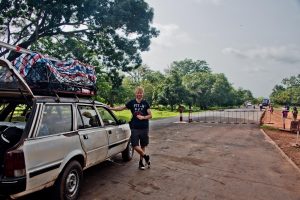 processing) works fine. He asks for no “cadeau” (present). The music that is blasting out of the little border shed is suddenly Brazilian samba music. That sounds sweet after too many days with high pitched and not too melodic Senegalese drum based fusion music. A country with samba music is on the other hand instantly likable.
processing) works fine. He asks for no “cadeau” (present). The music that is blasting out of the little border shed is suddenly Brazilian samba music. That sounds sweet after too many days with high pitched and not too melodic Senegalese drum based fusion music. A country with samba music is on the other hand instantly likable.
Our cozy guesthouse is named “pensao central” and as the name suggests it is situated in the very heart of Bissau. It is a guesthouse of the sort every guesthouse used to look like 10 years ago. A wooden old building with high ceilings and beds with wooden posts to hold the mosquito nets 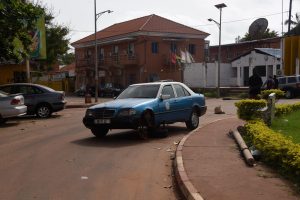 and equipped only with a table fan. The bathroom is communal and the common room offers book exchange, board games and dvds. The owner is a locally married Swiss guy who does not like the internet so it is very, very hard to book in advance.
and equipped only with a table fan. The bathroom is communal and the common room offers book exchange, board games and dvds. The owner is a locally married Swiss guy who does not like the internet so it is very, very hard to book in advance.
We spend a few days sightseeing in Bissau. Checking out the “cidade velho” – old city – and the large fort that my children informs me has 24 canons sticking out of.
Everything seems orderly and relaxed in town. We sleep with our windows open in despite of being in the very center of the town where seedy people (of which we see none) could have been 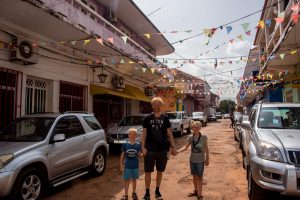 expected to roam. Next to or pensao is the infamous hotel Kalliste where UN employess and war reporters according to our Lonely Planet guidebook through the time have met over many a gin and tonic (presumably paid for by UN their media networks)
expected to roam. Next to or pensao is the infamous hotel Kalliste where UN employess and war reporters according to our Lonely Planet guidebook through the time have met over many a gin and tonic (presumably paid for by UN their media networks)
Suddenly somebody is speaking Norwegian outside our room at the pensao. A middle-aged couple from Norway have turned up looking for a room. For a week we have met very close to zero other tourists and meeting someone with who we can communicate in our own languages (danes, 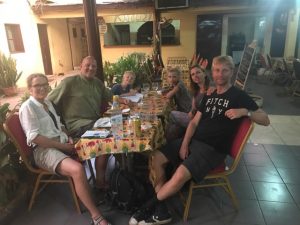 swedes and Norwegians can usually communicate using their own languages) is nice. The kids are overly thrilled since they – for once – are actually able to understand our conversation when we have dinner at the Kalliste that same night. Even more coincidental the Norwegian couple are both members of the same Danish travel club as we are (Travellers Club of Denmark – De Berejstes Klub). The world is small.
swedes and Norwegians can usually communicate using their own languages) is nice. The kids are overly thrilled since they – for once – are actually able to understand our conversation when we have dinner at the Kalliste that same night. Even more coincidental the Norwegian couple are both members of the same Danish travel club as we are (Travellers Club of Denmark – De Berejstes Klub). The world is small.
Going back to Senegal again we have the good fortune of going with Sadaga. The roads are surprisingly good and almost all of the major roads are tarred. Which is fortunate because we are here in the rainy season and rain can make travelling on the red mud roads painfully slow. We only have a few stretches of around 500 meters of unpaved to traverse in northern Guinea Bissau. At one of those red earth stretches I ask Sadaga to stop the car. It is my 175th country anniversary and I would like a funny picture of me with my trolley suitcase and Charlotte and the kids with heavy backpacks (When I continue solo after the family have gone back I like to go hand luggage only hence the trolley..). Iconsidered also smoking a cigar but found none in Bissau.
Sadaga turns out to be a great photographer and I get my photo before leaving this friendly country.
Mauritania and GB where (unfortunately) short visits since we prioritized spending more time in Gambia and Senegal – they are coming up soon – stay tuned.

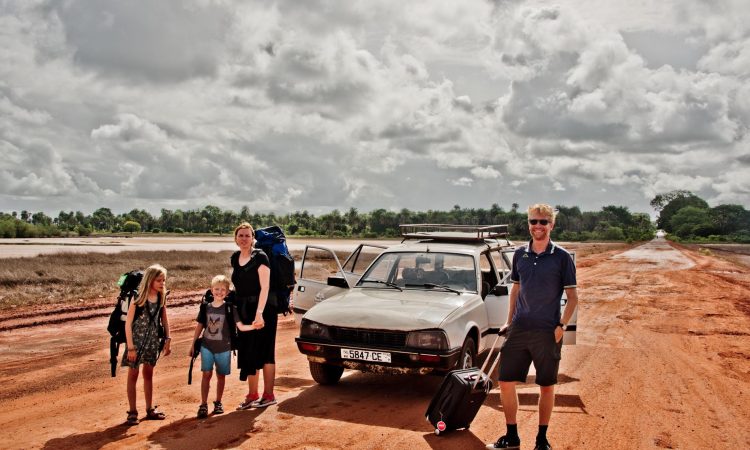
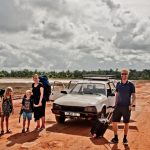
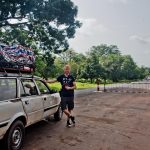
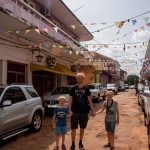
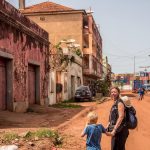
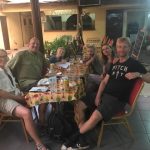
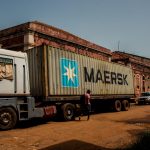
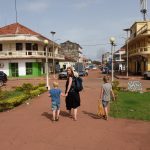
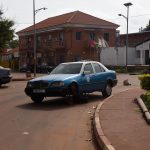
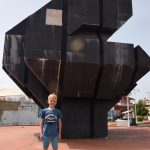
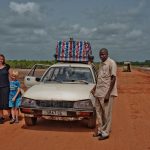
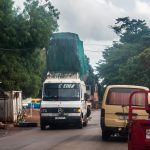
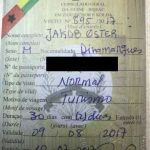
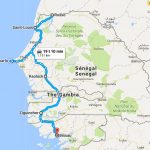
That’s nice you ran into a Norwegian couple while there! It’s always nice to have some familiarity while traveling, especially when you are tired of trying to communicate in another language and finally you can speak your own.
Thanks for sharing you trip. 🙂
Thx so much Louise 🙂
Guinea-Bissau is such a friendly and lovely country! Next time you must visit bijagos island. Beautiful